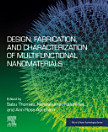Upconversion Nanophosphors
À propos de cet e-book
À propos de l'auteur
Sabu Thomas is a Professor and Director of the International and Interuniversity Centre for Nanoscience and Nanotechnology, Mahatma Gandhi University, Kerala, India. Professor Thomas is internationally recognized for his contributions to polymer science and engineering, with his research interests encompassing polymer nanocomposites, elastomers, polymer blends, interpenetrating polymer networks, polymer membranes, green composites, nanocomposites, nanomedicine, and green nanotechnology. His groundbreaking inventions in polymer nanocomposites, polymer blends, green bionanotechnology, and nano-biomedical sciences have significantly advanced the development of new materials for the automotive, space, housing, and biomedical fields.
Kanchan Upadhyay is a Post-doc Fellow at the International and Inter University Centre for Nanoscience and Nanotechnology, Mahatma Gandhi University. She obtained her PhD in Chemistry at Pt. Ravishankar Shukla University and received the Govt. Chhattisgarh Young Scientist Award in 2015. Her research interests are analytical chemistry and synthesis and luminescence properties of phosphors.
Raunak Kumar Tamrakar is an Assistant Professor for the Department of Applied Physics at the Bhilai Institute of Technology. He obtained a PhD in Solid State Physics at Pt. Ravishankar Shukla University in 2016 and is a lifetime member of the Luminescence Society of India. His main research interests are synthesis and luminescence properties of phosphors.
Dr. Nandakumar Kalarikkal is an Associate Professor at the School of Pure and Applied Physics and Joint Director of the International and Inter University Centre for Nanoscience and Nanotechnology of Mahatma Gandhi University, Kottayam, Kerala, India. His research activities involve applications of nanostructured materials, laser plasma, and phase transitions. He is the recipient of research fellowships and associateships from prestigious government organizations such as the Department of Science and Technology and Council of Scientific and Industrial Research of the Government of India. He has active collaborations with national and international scientific institutions in India, South Africa, Slovenia, Canada, France, Germany, Malaysia, Australia, and the United States. He has more than 130 publications in peer-reviewed journals. He also co-edited nine books of scientific interest and co-authored many book chapters.







